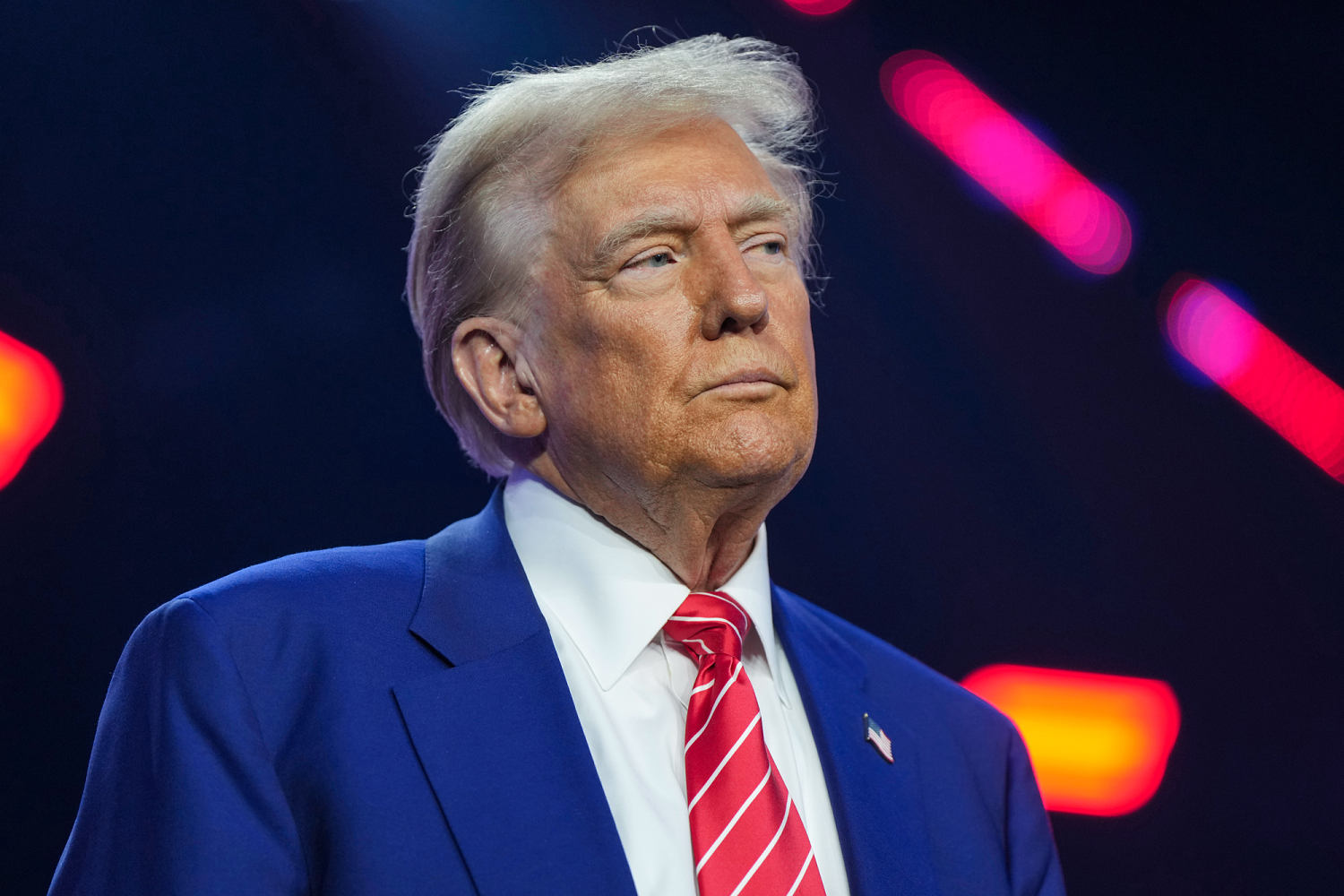

Welcome to the online version of From the Politics Desk, an evening newsletter that brings you the NBC News Politics team’s latest reporting and analysis from the White House, Capitol Hill and the campaign trail.
In today’s edition, Sahil Kapur dives into how President Donald Trump has been reluctant to even attempt to reach across the aisle to Democratic lawmakers on policy proposals that could attract bipartisan support. Plus, we look at how markets soared after the U.S. and China agreed to ease their trade war — even as some uncertainty remains.
Sign up to receive this newsletter in your inbox every weekday here.
— Adam Wollner
Trump’s drug pricing move shows his second-term reluctance to try bipartisanship
By Sahil Kapur
President Donald Trump’s executive order on Monday to cut prescription drug costs by imposing a “most favored nation” pricing model drew a pithy retort from Sen. Bernie Sanders, I-Vt., Washington’s most outspoken proponent of taking on Big Pharma.
“[A]s Trump well knows, his executive order will be thrown out by the courts,” said Sanders, the ranking member of the Committee on Health, Education, Labor and Pensions. “If Trump is serious about making real change rather than just issuing a press release, he will support legislation I will soon be introducing to make sure we pay no more for prescription drugs than people in other major countries. If Republicans and Democrats come together on this legislation, we can get it passed in a few weeks.”
Trump’s order is a directive to the Health and Human Services secretary to act on the goal — achieving parity with other developed countries on what Medicare and Medicaid pay for drugs — within 30 days. But the bigger problem is that a version of the idea was attempted by Trump in his first term, and blocked in court. The new order may run into the same brick wall before it can deliver any benefits.
The back-and-forth points to a unique tendency for Trump in his second term: a reluctance to attempt bipartisanship, even when there is significant overlap with Democrats on a goal.
Instead, Trump has repeatedly sought to go it alone — at risk of failure. The self-styled “dealmaker” is passing up opportunities for a deal, lest he have to share the victory with his political foes.
It is a break from tradition. Presidents typically attempt to achieve congressional approval for their goals, knowing that legislation is the best way for a policy to overcome legal hurdles and — especially if it’s bipartisan — to stand the test of time. Trump is taking a different route, relying on executive action and party-line bills to advance his agenda.
The move on drug pricing is just the latest example. In recent weeks, Trump has hinted at support for raising taxes on upper earners, a goal that has virtually unanimous Democratic support and could turn into a bipartisan victory. Instead, he has repeatedly offered it up as a trial balloon for his party-line agenda bill, only for Republicans to shoot it down each time (and to question whether he’s even serious about it).
Another example is Trump’s campaign promise of government-funded IVF treatments, a goal that Democrats are more supportive of than Republicans. Indeed, GOP lawmakers say they have no intention of advancing IVF funding in their bill. Yet there has been scant effort by Trump at a bipartisan deal that could deliver on the promise.
The tendency helps explain why Trump signed fewer bills into law than any president since the 1950s during his first 100 days in office. Trump’s GOP trifecta includes a paper-thin House majority and a 60-vote hurdle in the Senate to pass most legislation, making his task of signing new laws even more complicated without any Democratic support.
House Republicans still have a lot of work ahead of them to reach consensus on their massive bill for Trump’s agenda, even as they start releasing key parts of legislative text for the package. Here’s the latest from Capitol Hill:
- House Republicans unveil sweeping tax plan but have yet to resolve key fight over SALT, by Scott Wong, Melanie Zanona and Sahil Kapur
- Fight over Medicaid cuts heats up as House Republicans release bill, by Sahil Kapur
U.S. and China take major step toward easing trade war
By Jennifer Jett, Peter Guo and Rob Wile
The United States and China announced a 90-day pause on most of their recent tariffs on each other, fueling hopes on Wall Street of a cooldown in the trade war between the world’s two largest economies.
The combined U.S. tariffs rate on Chinese imports will be cut to 30% from 145%, while China’s levies on U.S. imports will be cut to 10% from 125%, the two countries said in a joint statement.
The early morning announcement came after officials from the two countries met in Geneva over the weekend. It was the first face-to-face talks on the tariffs since President Donald Trump’s shock “Liberation Day” announcement last month imposing 84% duties on Chinese imports, which subsequently climbed to 125% — and then to 145% a day later.
The math: The new 30% rate is the sum of the 20% duty imposed during the first weeks of his second term in response to alleged Chinese inaction on fentanyl flows, alongside the 10% across-the-board tariff Trump has imposed on all countries.
How the markets responded: The Dow Jones Industrial Average closed up more than 1,100 points, an increase of about 2.8%. With those gains, the Dow is now even for the year after having declined as much as 11%. Still, it remains 5.5% below the highs it reached in February. The S&P 500, the broadest stock index, added 3.3%.
Note of caution: Some analysts have urged caution, noting that tariffs remain far higher than before Trump returned to office. That suggests many consumer goods — from cars and groceries to fireworks — are set to see price hikes. Federal data is set to provide a fresh inflation snapshot on Tuesday morning.
“The full set of U.S. tariffs would still be considerably higher and broader than expected by markets at the start of the year,” Goldman Sachs analysts wrote in a note to clients Monday, noting that the 90-day countdown “should keep uncertainty high for both investors and businesses.”
Read more →
🗳️ Midterm roundup
There may still be 540 days until the 2026 elections (who’s counting?), but we’ve seen a flurry of candidates jump in — and others opt out — of key races around the country over the past 72 hours.
Here’s the latest from the campaign trail:
- Georgia Senate: Rep. Marjorie Taylor Greene, R-Ga., passed on a run against Democratic Sen. Jon Ossoff, while state Insurance Commissioner John King became the second major Republican to enter the race.
- Michigan Senate: Former state House Speaker Joe Tate joined the state’s crowded Democratic primary for the seat being vacated by retiring Sen. Gary Peters.
- Iowa governor: Rob Sand, Iowa’s state auditor and its only statewide Democratic officeholder, announced a bid for governor. And on the GOP side, Rep. Randy Feenstra filed paperwork for his campaign.
- Florida governor: State Sen. Jason Pizzo, fresh off a high-profile break with the Democratic Party, is running for governor as an independent.
- Michigan’s 13th District: Meanwhile, Rep. Rashida Tlaib, D-Mich., backed state Rep. Donovan McKinney’s primary challenge to her colleague, Rep. Shri Thanedar.
🗞️ Today’s other top stories
- ✈️ Trump’s jet bet: Trump mocked Democratic backlash to his administration’s plan to accept a Boeing super luxury jet from Qatar, estimated to be worth hundreds of millions of dollars. Read more →
- ➡️ Hostage release: Edan Alexander, who is believed to be the last living U.S. citizen held captive in Gaza, was released by Hamas. Read more →
- 😐 Frenemies: Trump and Israeli Prime Minister Benjamin Netanyahu’s relationship has been strained by disagreements over how to handle Israel’s war against Hamas in Gaza. Read more →
- 💲 Deportation price tag: The Trump administration spent at least $21 million transporting migrants to Guantanamo Bay on military aircraft between Jan. 20 and April 8. Read more →
- ⬅️ Fading away: Tech billionaire Elon Musk’s regulatory problems with the federal government have been receding in the early months of the Trump administration. Read more →
- 👀 Hindsight is 2024: Sen. Amy Klobuchar, D-Minn., told “Meet the Press” that her party would have been “better served by a primary” in last year’s presidential election. Read more →
- Follow live politics updates on our blog →
That’s all From the Politics Desk for now. Today’s newsletter was compiled by Adam Wollner and Ben Kamisar.
If you have feedback — likes or dislikes — email us at politicsnewsletter@nbcuni.com
And if you’re a fan, please share with everyone and anyone. They can sign up here.
 Latest World Breaking News Online News Portal
Latest World Breaking News Online News Portal






